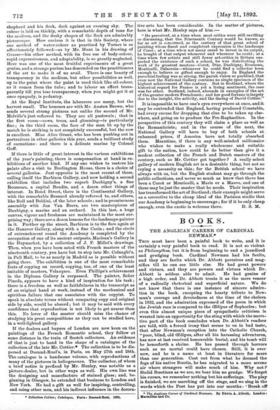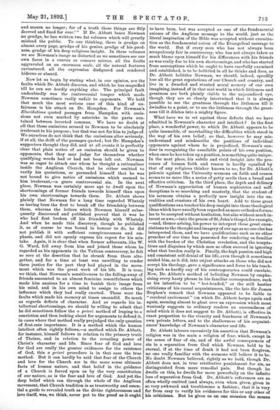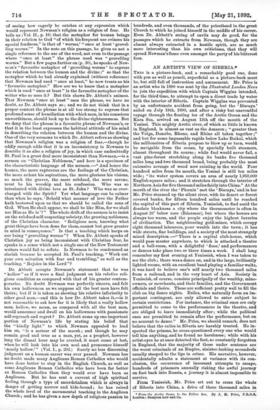BOOKS.
THE ANGLICAN CAREER OF CARDINAL NE WKA.N.* THis must have been a painful book to write, and it is- certainly a very painful book to read. It is not so violent as Philomythua, but it is from beginning to end a jaundiced and grudging book. Cardinal Newman had his faults, and they are faults which Dr. Abbott perceives and mag- nifies till he can see little else. He had great powers and virtues, and they are powers and virtues which Dr.. Abbott is seldom able to admit. He had genius of a high order, and Dr. Abbott treats it as the mere veneer of a radically rhetorical and superficial nature. We do. not know that there is one instance of sincere admira- tion in the book, excepting the hearty tribute to New- man's courage and devotedness at the time of the cholera in 1832, and the admiration expressed of the poem in which the Jewish race is compared to the adipus of Sophocles ; but even this almost unique piece of sympathetic criticism is wrested into an opportunity for the sting with which the narra- tive part of the book concludes when Dr. Abbott's readers are told, with a forced irony that seems to us in bad taste, that after Nevrman's reception into the Catholic Church, "poor, blind, old CEdipus, after all his harassing adventures, has now at last received honourable burial, and his tomb will' be henceforth a shrine. He has passed through horrors such as no mortal could have chosen. Still, it is over now, and he is a name at least in literature for more than one generation. Cast out from what he deemed the fogs of his native Bceotia, he has migrated to a more serene air where strangers will make much of him. Why not ?' Stolid Bceotians as we are, we bear him no grudge. We forget his curses, we remember nothing but his sufferings. The play is finished, we are marching off the stage, and we sing in the words which the Poet has put into our mouths : Break off
• The Anglioan Career of Cardinal Newman. By Edwin A. Abbott. London: Macmillan and Co. and mourn no longer; for of a truth these things are fitly decreed and fixed for ever.'" If Dr. Abbott bears Newman no grudge, he has written two fat volumes which will greatly mislead the public. To our thinking, there is grudge on almost every page, grudge of his genius, grudge of his good- ness, grudge of his deep religions insight. In these volumes we see Newman's image as distorted as we sometimes see our own faces in a convex or concave mirror, all the faults aggravated on an enormous scale, all the natural features caricatured, all the expression disfigured and rendered hideous or absurd.
Now let us begin by stating what, in our opinion, are the faults which Dr. Abbott discerns, and which he has magnified till he can see hardly anything else. The principal fault undoubtedly was the controversial temper which made Newman sometimes really unfair to opponents. We hold that much the most serious case of this kind of un- fairness is his attack on Dr. Hampden. For Newman's Elucidations quoted passages from Hampden with omis- sions not even marked by asterisks in the parts con- tained between inverted commas. We have no doubt at all that those omissions seemed to Newman to be absolutely irrelevant to his purpose ; but that was not for him to judge of. We ourselves do not think that the omissions alter seriously, if at all, the drift of the passages quoted; but Dr. Hampden's supporters thought they did, and at all events it is perfectly clear that plain notice of an omission should be given to opponents, that they may judge for themselves whether qualifying words had or had not been left out. Newman was so eager to attack one whom he thought a rationaliser inside the Anglican Church, that he either omitted to verify his quotations, or persuaded himself that he was not bound to give notice of omissions which seemed to him irrelevant,—a grave controversial sin. In the next place, Newman was certainly more apt to dwell upon the shortcomings of former friends towards himself than upon his own shortcomings towards them. Dr. Abbott shows plainly that Newman for a long time regarded Whately as having been the first to break off the friendship between them, whereas the letters which Newman himself subse- quently discovered and published proved that it was he who had first broken off his friendship with Whately. And when he made this discovery, though he published it, as of course he was bound in honour to do, he did not publish it with sufficient conspicuousness and em- phasis, and did not openly express his regret for his mis- take. Again, it is clear that when former adherents, like W. G. Ward, fell away from him and joined those whom he regarded as his opponents in the Vatican controversy, he felt so sore at the desertion that he shrank from them alto- gether, and for a time at least was unwilling to render them justice for the part they had played in the move- ment which was the great work of his life. It is true, we think, that Newman's sensitiveness to the falling-away of friends amounted to an almost feminine resentfulness which made him anxious for a time to banish their image from his mind, and in his own mind to assign to others the influence which they had really exerted. These were the faults which made his memory at times nncandid. So much as regards defects of character. And as regards his in- tellectual shortcomings, we should be willing to admit that he did sometimes follow the a priori method of leaping to a conviction and then looking about for arguments to defend it, in cases where that method really prejudged the only question of first-rate importance. It is a method which the human intellect often rightly follows,—a method which Dr. Abbott, for instance, himself follows in relation to the primary truth of Theism, and in relation to the revealing power of Christ's character and life. Since fear of God and love for God are really the greater evidences for the existence of God, this a priori procedure is in that case the true method. But it can hardly be said that fear of the Church and love for the Church are in the same sense ultimate facts of human nature, and that belief in the guidance of a Church is forced upon us by the very constitution of our nature, as is the fear and love of God. And yet the deep belief which ran through the whole of the Anglican movement, that Church tradition is as trustworthy and essen- tial a guide to revealed truth as the divine righteousness and love itself, was, we think, never put to the proof as it ought
to have been, but was accepted as one of the fundamental axioms of the Anglican message to the world, just as the literal inspiration of the Bible was accepted without examina- tion as the fundamental axiom of the Evangelical message to the world. But if every man who has not always been scrupulously fair in controversy, who has not always taken as much blame upon himself for his differences with his friends as was really due to his own shortcomings, and who has started from assumptions which he ought to have carefully examined and established, is to be belittled in all he thinks and does, as Dr. Abbott belittles Newman, we should, indeed, speedily lose all the great reputations of our Church and country, and live in a dwarfed and stunted moral scenery of our own imagining, instead of in that real world in which littleness and greatness are both plainly visible to the unjaundiced eye, though they are so closely intertwined that it is always possible to see the greatness through the littleness till it dwindles to a point, or to see the littleness through the great- ness till it dilates into a mighty figure.
What have we to set against these defects that we have admitted in Newman's character and intellect ? In the first place, a wonderful power, to which Dr. Abbott appears to be quite insensible, of marshalling the difficulties which stood in the way of his own belief; so that, however he may mis- understand and misdescribe the positions of individual opponents against whom he is prejudiced, Newman's can- dour in recognising the assailable points of his own position, when once he has taken up a position, is something quite unique. In the next place, his subtle and vivid insight into the pro- cesses of human faith and reason is hardly equalled by that of any religious thinker known to us; for Dr. Abbott's polemic against the University sermons on faith and reason seems to us more like a series of petty cavils than a broad and effective criticism. In the third place, the depth and delicacy of Newman's appreciation of human sophistries and self- deceptions is so searching and masterly, that the student of his sermons obtains a perfectly new insight into the un- realities and evasions of his own heart. Add to these great qualifications as a teacher his deep insight into those theological ideas which have usually been regarded as mere orthodox formu- las to be accepted without hesitation, but also without much in- terest or awe,—into the proem of St. John's Gospel, for example, —and, thence arising, his power to interpret these great enun- ciations to the thought and imagery of our age as no one else has interpreted them, and we have qualifications such as no other preacher of our time has possessed for rendering us familiar with the burden of the Christian revelation, and the tempta- tions and disguises by which men so often succeed in ignoring what that burden really is. Finally, the high passion and high and consistent self-denial of his life, even though it sometimes misled him, as it did, into unjust attacks on those who did not accept his theology, gave a significance and force to his teach- ing such as hardly any of his contemporaries could emulate. Now, Dr. Abbott's method of belittling Newman by empha- sising every hasty phrase in his familiar correspondence, such as his intention to be "hot-headed,"• or the still hastier criticisms of his casual acquaintances, like the late Sir James Stephen's remark that Newman appeared to be liable to "cerebral excitement" (on which Dr. Abbott harps again and again, seeming almost to gloat over an expression which most wantonly suggests to ordinary readers an unsoundness of mind which it does not suggest to Dr. Abbott), is effective in exact proportion to the vivacity and frankness of Newman's own private letters, and to the shallowness of his acquaint- ances' knowledge of Newman's character and life.
Dr. Abbott labours excessively his assertion that Newman's religion was in the main a religion of fear, which, except in the sense of fear of sin, and of the awful consequences of sin in a separation from God which Newman held to be eternal, if at the time of death it had not been forgiven, no one really familiar with the sermons will believe it to be. No doubt Newman believed, rightly as we hold, though Dr. Abbott does not, in true retributive punishment for sin, as distinguished from mere remedial pain. But though he dwells on this, he dwells far more powerfully on the infinite loss of separation from God. Dr. Abbott's references are so often wholly omitted (and always, even when given, given in so very awkward and troublesome a fashion), that it is very far from easy to verify his evidences for this or any other of his criticisms. But he gives as on one occasion the means
of seeing how eagerly he catches at any expression which would represent Newman's religion as a religion of fear. He tells us (Vol. IL, p. 16) that the metaphor for human beings in their relation to God "of which his frequent use evinces his special fondness," is that of worms,' "once at least grovel- ling worms." In the note on this passage, he gives us not a single reference to the use of the word, not even to the passage where "once at least" the phrase used was "grovelling worms." But a few pages further on (p. 30), he speaks of New- min's "favourite- metaphor of grovelling worms' to express the relation between the human and the divine ;" so that the metaphor which he had already explained (without reference) that Newman had used "once at least," he now treats as his "favourite metaphor." How are we to know that a metaphor which is used "once at least" is the favourite metaphor of the writer who so uses it? But this shows Dr. Abbott's animus. That Newman "once at least" uses the phrase, we have no doubt, as Dr. Abbott says so ; and we do not think that in a proper context the phrase is at all too strong to express that profound sense of humiliation with which man, in his conscious unworthiness, should look up to the divine righteousness. But we deny that the phrase is a favourite phrase of Newman's, or that it in the least expresses the habitual attitude of his mind in describing the relation between the human and the divine. One of the very sermons to which Dr. Abbott refers as showing that Newman's religion was a religion of fear,—though he oddly enough adds that it is an inconsistency in Newman to describe it as also a religion of joy, in which case undoubtedly St. Paul is a great deal more inconsistent than Newman,—is a sermon on "Christian Nobleness," and here is a specimen of the characteristic language of the sermon :—" And hence the keener, the more rapturous are the feelings of the Christian, the more ardent his aspirations, the more glorious his visions, so much the graver, the more subdued, the more serene, mast be his worship and his confession. Who was so intoxicated with divine love as St. John ? Who was so over- charged with the Spirit? Yet what language can be calmer than when he says, 'Behold what manner of love the Father hath bestowed upon us that we should be called the sons of God. When He shall appear, we shall be like Him, for we shall see Him as He is '?" The whole drift of the sermon is to insist on the subdued self-respecting sobriety, the growing nobleness, of the Christian character. "Religious men, knowing what great things have been done for them, cannot but grow greater in mind in consequence." Is that a teaching which harps on our being "grovelling worms"? When Dr. Abbott speaks of Christian joy as being inconsistent with Christian fear, he speaks in a sense which not a single one of the New Testament writers would fail to refute. Is Newman to be condemned as slavish because he accepted St. Paul's teaching, "Work out your own salvation with fear and trembling," as well as the teaching, "Rejoice in the Lord"?
Dr. Abbott accepts Newman's statement that he was " hollow " as if it were a final judgment on his relative reli- gious condition as compared with that of his greater contem- poraries. No doubt Newman was perfectly sincere, and felt his own hollowness as we suppose all the best men have felt theirs; but if it is taken as showing his relative inferiority to other good men,—and this is how Dr. Abbott takes it,—is it not reasonable to ask how far it is likely that a really hollow man, hollow, we mean, as compared with all the best men, would announce and dwell on his hollowness with passionate self-reproach and regret? Dr. Abbott sums up one important portion of Newman's life by stating his belief that the "kindly light" to which Newman appealed to lead him on, "is a meteor of the marsh ; and though he may remain good and true as a man, yet, as a prophet, however long the dismal hour may be averted, it must come at last, when he will look into his own soul and pronounce himself ',nearly hollow." (Vol. I., p. 292.) Surely no' less discerning judgment on a human career was ever passed. Newman has no doubt made many Anglicans Roman Catholics who would have done better to stay in the English Church, as well as some Anglicans Roman Catholics who have been far better as Roman Catholics than they would ever have been as Anglicans. But he has sent a current of high spiritual feeling through a type of sacerdotalism which is always in danger of getting narrow and hide-bound ; he has raised the whole level of the sacramental teaching in the Anglican Church ; and he has given a new depth of religious passion to hundreds, and even thousands, of the priesthood in the great Church to which he joined himself in the middle of his career. Even Dr. Abbott's string of cavils may do good, for the passages which he extracts from Newman, though they are almost always extracted in a hostile spirit, are so much more interesting than his own criticisms, that they will spread Newman's fame even amongst the party of his bitterest foes.




































 Previous page
Previous page